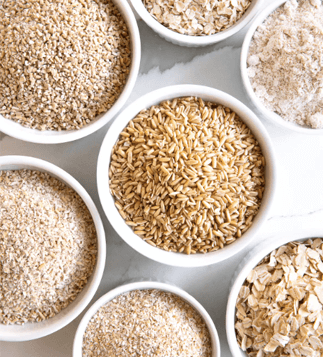Forks Over Knives Guide to Oats: Oat Milk, Oat Flour & Overnight Oats
 Rolled or steel-cut, ground into flour or blended into plant milk, oats are inexpensive, easy to prepare, and naturally gluten-free (with an important caveat; see ‘NOTE’ below). Everything you need to know about the whole grain that oat-tolerant celiacs can enjoy!
Rolled or steel-cut, ground into flour or blended into plant milk, oats are inexpensive, easy to prepare, and naturally gluten-free (with an important caveat; see ‘NOTE’ below). Everything you need to know about the whole grain that oat-tolerant celiacs can enjoy!
- Mary Margaret Chappell, forksoverknives.com 1
NOTE: ARE OATS GLUTEN-FREE?
Oats themselves do not contain gluten, a protein specific to the wheat family of cereal grains, but oat crops often become cross-contaminated with wheat both in the field and during processing.
That means that the end products can contain traces of gluten. Cooks who are highly sensitive to gluten or have celiac disease should opt for oat products that are processed in wheat-free plants and labeled as certified gluten-free.
Oats also contain avenin, a protein similar to gluten that has been shown to exacerbate symptoms in a small percentage of people with celiac disease.
SEE ALSO: New ACG Guidelines Suggest that Oats Can Cause an Immune Response in Some Celiacs
OATS VS. OATMEAL
Technically speaking, “oats” is the word for raw oat groats as well as the plant and the harvested cereal crop.
Oatmeal refers to oat groats that have been minimally processed (i.e., rolled, ground, or steel-cut) for culinary uses, including hot cereal.
These days, the terms are used interchangeably and can refer to ingredients or prepared dishes. Oat bran, which is the outer coating of the oat groat, is marketed and used just like oatmeal.
DIFFERENT TYPES OF OATMEAL
There are three different types of oatmeal available: rolled oats, steel-cut, and ground oats.
ROLLED OATS
Rolled oats are oat groats that have been steamed then rolled between steel rollers to flatten them into quick-cooking flakes.
There are a few different forms of rolled oats: instant, quick, old-fashioned, and thick-cut or extra-thick. The only difference between them is the flakes’ thickness. The thinner the oats are rolled, the faster they cook.
None of the oats’ fiber is lost in the process, so choosing one type of rolled oat over another is a matter of taste and preference. (Note: If you choose instant oats, look for oats-only options rather than more processed versions with added sugar and salt.)
Extra-thick and old-fashioned rolled oats will be firmer and chewier than quick or instant oats and take 2 to 3 minutes longer to cook.
STEEL-CUT/IRISH/PINHEAD OATS
The coarse-style oatmeal favored in Ireland is made by splitting each groat into two or three pieces. Steel cut oats need 15 to 25 minutes of cooking time, but the results are a hearty hot cereal that’s deliciously chewy.
SCOTTISH OATS
Also known as porridge, Scottish oats are whole oat groats that have been ground into small pieces. They cook in 10 minutes and have a creamy, uniform texture.
PRO TIP: 2 MINUTES IS ALL IT TAKES FOR PERFECTION
The secret to perfectly creamy oatmeal? Letting it rest two minutes before eating or serving. The down time lets the oats thicken and plump up without overcooking into a sticky or compact mass.
HOW TO MAKE OAT MILK
Need some tasty, creamy plant milk fast? Blend up a batch of oat milk. Unlike other plant milk bases, oats require no soaking beforehand. Simply purée 1 cup rolled oats with 3 cups water until creamy; then strain the milk through a cheesecloth-lined fine-meshed strainer or a nut milk bag. Store in the fridge for up to 3 days.
How to Make Creamy Oat Creamer!
HOW TO MAKE OAT FLOUR
Because oats are such a tender whole grain, they can be easily ground into flour with a blender or food processor. Count 1 cup of rolled oats for 1 cup of flour or 1 cup of steel-cut oats for 2 cups of flour. Add to blender or a food processor and blend until they reach a fine, flourlike texture.
HOW TO MAKE OVERNIGHT OATS
“Overnight oats” is something of a misnomer: it only takes two hours for overnight oats made with rolled oats to be ready to eat. (Steel-cut oats will take longer.) But it’s a perfect way to prep your breakfast for the next morning.
Soak 1 part oats in 2 parts liquid (water or plant milk or a combination) for 2 hours or overnight. Sweeten to taste, then top with your favorite cereal add-ins. Overnight oats will keep up to three days in the fridge and get softer and thicker as time passes. Enjoy them chilled, at room temperature, or heated up in the microwave.













